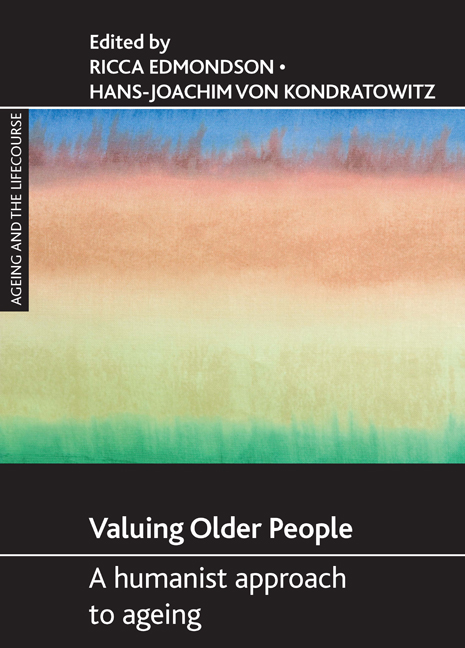Book contents
- Frontmatter
- Contents
- List of tables and figures
- Notes on contributors
- Acknowledgements
- Foreword
- Introduction
- Part One Religion, spirituality, cultural resources and creating meaning
- Part Two Norms, values and gerontology
- Part Three Ageing and wisdom? Conflicts and contested developments
- Afterwords
- Index
- Available titles in the Ageing and the Lifecourse series
twelve - Social practices, moral frameworks and religious values in the lives of older people
Published online by Cambridge University Press: 05 July 2022
- Frontmatter
- Contents
- List of tables and figures
- Notes on contributors
- Acknowledgements
- Foreword
- Introduction
- Part One Religion, spirituality, cultural resources and creating meaning
- Part Two Norms, values and gerontology
- Part Three Ageing and wisdom? Conflicts and contested developments
- Afterwords
- Index
- Available titles in the Ageing and the Lifecourse series
Summary
Introduction
This chapter aims to explore aspects of social norms and values in the everyday lives of older people in Ireland. It examines social practices and community participation among older people in one urban and one rural location, focusing on people's leisure interests, their involvement in clubs, their religious practices, voluntary work undertaken by them, their relationships with kin, friends and neighbours, help given and help received, their use of social services and their informal interactions. Thus it seeks to throw light on how older people live from day to day in neighbourhoods and communities: how they interact, what their social activities are, and to what extent these activities contribute to the meaningfulness and satisfaction in their lives. Many theoretical and empirical approaches in sociology depict older people's experiences in very individualistic terms. This study showed, in contrast, that communalinteractions are highly significant to the older people concerned and that social values are crucial to how they live their lives. These values are often embedded in religious beliefs, but we shall emphasise here the ways in which these give rise to forms of friendship that are central to sustaining older people's lives.
The chapter begins by exploring the religious practices and helping activities of older people in their localities, both through formal groups and informally. It emphasises the moral frameworks, explicit and implicit, in their lives. We then examine the links between religious belief/practice and social connectedness, highlighting the significance of religion for personal meaning and the importance of social ties embodied in religious communities. While connectedness itself is not examined in depth here (see Gallagher, 2008), we shall refer to many aspects of community, social capital and friendship. The key arguments are that friendship and community are central to the creation of a more habitable social world and that older people contribute significantly to the lives of others through what they do and how they interact. To this extent older people live according to wise social practices and these practices enhance both personal and communal well-being.
This study was based in two locations. Rathmore, the primary research site, is a suburban area of Dublin, and the secondary research site, Rathbeg, is a rural area in Donegal, in the North West of Ireland.
- Type
- Chapter
- Information
- Valuing Older PeopleA Humanist Approach to Ageing, pp. 217 - 232Publisher: Bristol University PressPrint publication year: 2009



